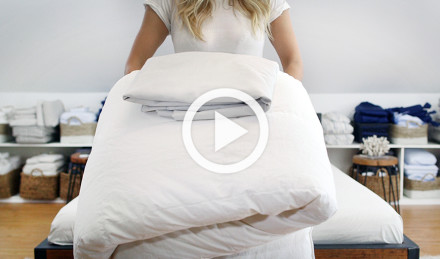Perhaps you’ve woken up in the middle of the night feeling warm and slightly damp, then simply kicked off your covers and dozed back to sleep. But if middle-of-the night disruptions have your pajamas and bedding consistently covered in sweat, you need to get to the bottom of it.
“While night sweats are common, it’s hard to define them since they can be caused by a number of different things,” says Michael Breus, Ph.D., board certified sleep specialist and author of “Good Night: The Sleep Doctors 4-week program to Better Sleep and Better Health.” “Hyperhidrosis is the medical term for someone who sweats excessively, even when in a cool environment or when they’re at rest," says Michael. We sweat to dissipate heat – and perspiration accomplishes that – but night sweats are a temperature deregulation issue in the body. Here, Michael and other experts explain the science and psychology behind night sweats so that you can rest better.
After exploring some possible causes, be sure to explore our list of the best breathable bedding options for night sweats down below.
Common Causes of Night Sweats
You may be coming down with something
If you never have night sweats and then are suddenly soaking your clothes and bed for a few nights in a row, it could be a sign you have an infection coming on, says Michael. If the sweats are accompanied by unexplained weight loss, see your doctor to rule out a serious health problem.
You may be coming down with something
If you never have night sweats and then are suddenly soaking your clothes and bed for a few nights in a row, it could be a sign you have an infection coming on, says Michael. If the sweats are accompanied by unexplained weight loss, see your doctor to rule out a serious health problem.
You drank too much the night before
It’s very common for people who’ve been out on the town to wake up sweating in the middle of the night. Your body overheats while metabolizing alcohol or tries to get alcohol out of you by sweating. Stick to two drinks or less so the hard stuff doesn’t tax your body while you sleep.
You drank too much the night before
It’s very common for people who’ve been out on the town to wake up sweating in the middle of the night. Your body overheats while metabolizing alcohol or tries to get alcohol out of you by sweating. Stick to two drinks or less so the hard stuff doesn’t tax your body while you sleep.
Your monthly cycle is heating things up
Hormonal fluctuations can affect women at different phases of their menstrual cycle, says Erin Borbet, founder of Grow Wellness Acupuncture in New York and licensed practitioner of Acupuncture, Chinese Herbal Medicine and Doula Services. While night sweats are common in menopausal-age women, it happens in lot in a lot of younger women as well, she says.
Your monthly cycle is heating things up
Hormonal fluctuations can affect women at different phases of their menstrual cycle, says Erin Borbet, founder of Grow Wellness Acupuncture in New York and licensed practitioner of Acupuncture, Chinese Herbal Medicine and Doula Services. While night sweats are common in menopausal-age women, it happens in lot in a lot of younger women as well, she says.
You're anxious throughout the day
Stress, worries and anxiety can certainly play a role in insomnia and also cause you to wake up from sleep in damp clothes, says Erin. She elaborates, “In Chinese medicine, we believe worry and anxiety put your body into overdrive, so you’re working exponentially harder than you need to be.” Tacking anxiety and worry onto an already demanding work and personal schedule creates this hyperdrive in the body that leads to depletion — which can result in night sweats during restorative sleep. “From a Chinese medicine standpoint, that’s the perfect time for that depletion to show itself — when we’re finally still, the body can’t contain itself,” she says. Waking up in a cold sweat is a sign that there is something the body is trying to process, and you have to figure out if it’s an issue of deficiency or excess. It could be over-exercise or undernourishment, over-caffeinating, adrenal fatigue or medications. Make lifestyle changes to manage stress and remedy the problem.
You're anxious throughout the day
Stress, worries and anxiety can certainly play a role in insomnia and also cause you to wake up from sleep in damp clothes, says Erin. She elaborates, “In Chinese medicine, we believe worry and anxiety put your body into overdrive, so you’re working exponentially harder than you need to be.” Tacking anxiety and worry onto an already demanding work and personal schedule creates this hyperdrive in the body that leads to depletion — which can result in night sweats during restorative sleep. “From a Chinese medicine standpoint, that’s the perfect time for that depletion to show itself — when we’re finally still, the body can’t contain itself,” she says. Waking up in a cold sweat is a sign that there is something the body is trying to process, and you have to figure out if it’s an issue of deficiency or excess. It could be over-exercise or undernourishment, over-caffeinating, adrenal fatigue or medications. Make lifestyle changes to manage stress and remedy the problem.
Your diet is volatile (and a little spicy)
Whether you added a few dashes of hot sauce to your dinner, you overate too close to bedtime or you’re suffering from food allergies, all of these instances can cause nighttime sweating as well, says Catherine. Cut back on spicy foods late in the day, minimize portions closer to bedtime and get tested for food allergies if you think your body is struggling to process a particular food group.
Your diet is volatile (and a little spicy)
Whether you added a few dashes of hot sauce to your dinner, you overate too close to bedtime or you’re suffering from food allergies, all of these instances can cause nighttime sweating as well, says Catherine. Cut back on spicy foods late in the day, minimize portions closer to bedtime and get tested for food allergies if you think your body is struggling to process a particular food group.
You're taking new medications
Night sweats can be a side effect of some medications, like antidepressants, hormone replacements and blood sugar-lowering drugs, so confer with your doctor or pharmacist to determine if the drugs you’re taking could be causing this and if there are other options you can take that won’t interfere with your sleep.
You're taking new medications
Night sweats can be a side effect of some medications, like antidepressants, hormone replacements and blood sugar-lowering drugs, so confer with your doctor or pharmacist to determine if the drugs you’re taking could be causing this and if there are other options you can take that won’t interfere with your sleep.
So, what is the best bedding to help with night sweats?
Generally, the best bed sheets for night sweats are cooling sheets, as heavier bedding will leave you more prone to sweating while sleeping. Consider the most lightweight options possible when exploring duvets, blankets and quilts, pillowcases, and top sheets.
If you're waking up sweating, here are some of the best bed sheet materials that will help you sweat less:
1. Percale Bedding
So, what is the best bedding to help with night sweats?
Generally, the best bed sheets for night sweats are cooling sheets, as heavier bedding will leave you more prone to sweating while sleeping. Consider the most lightweight options possible when exploring duvets, blankets and quilts, pillowcases, and top sheets.
If you're waking up sweating, here are some of the best bed sheet materials that will help you sweat less:
1. Percale Bedding
Percale sheets made from long-staple Egyptian-cotton are famously lightweight sheets. This naturally cool and breathable cotton is the best bed sheet material for night sweats. Also worth noting, the soft-to-the-touch material will have you sleeping better in general as well.
To learn more about percale, read on in our Percale: Know Your Bedding Like a Designer guide.
2. Down and Down Alternative Bedding
Down fill is notably soft, making it a viable option for your lightweight duvet or mattress topper. Or, if you'd prefer an allergy-free option, consider down alternative bedding.
To decide which of the two is better for you, read on in the Down vs. Down Alternative and Down Comforter 101: What is Fill Power guides.
3. Brushed Cotton Bedding
If you're looking for a warm option that will reduce your night sweating, this is the way to go. While this ultra-cozy cotton is a perfect winter bedding material with its warming abilities, it is still notably breathable and will cool your body off by not trapping heat.
to learn more about brushed cotton, read on in our Brushed Cotton: Know Your Bedding Like a Designer
Cooling Bedding for Night Sweats - In Conclusion
Overall, the key to overcoming night sweats is to determine the cause, speak with medical professionals about treatment, and to opt for lightweight bed sheets for your bedroom.
Parachute's Oeko-Tex certified and ultra-cozy bed sheets made of breathable cotton can have you sleeping better and sweating less.
For more ways to improve your sleep, read on:
Bedroom Furniture Essentials: Everything Your Room Need
Waffle Weave Fabric: Best Waffle Weave Bedding, Bath, & Clothing Essentials
Why Sleep on a Silk Pillowcase?
Best Organic Pillows: What to Look For in Sustainable Pillows
Best Organic Bed Sheets: What to Look For in Organic Bedding









